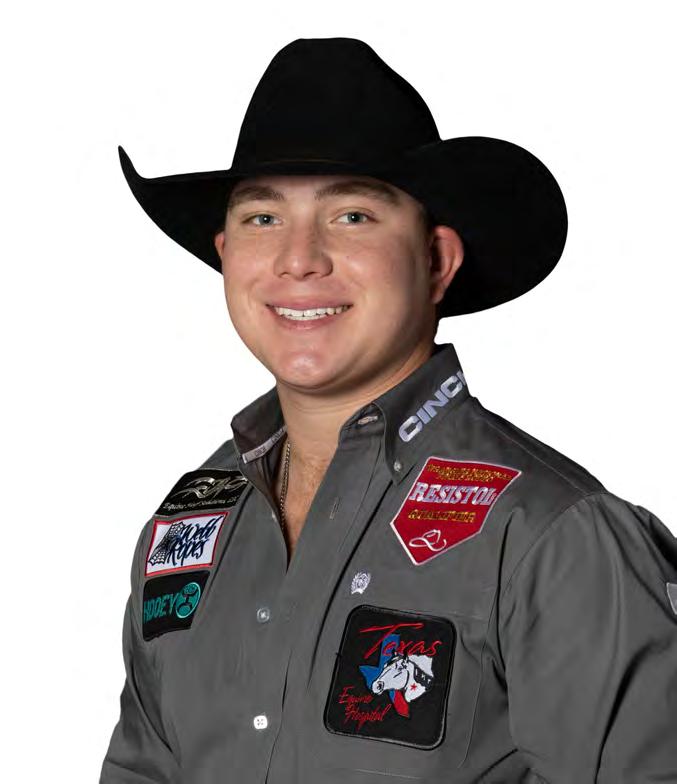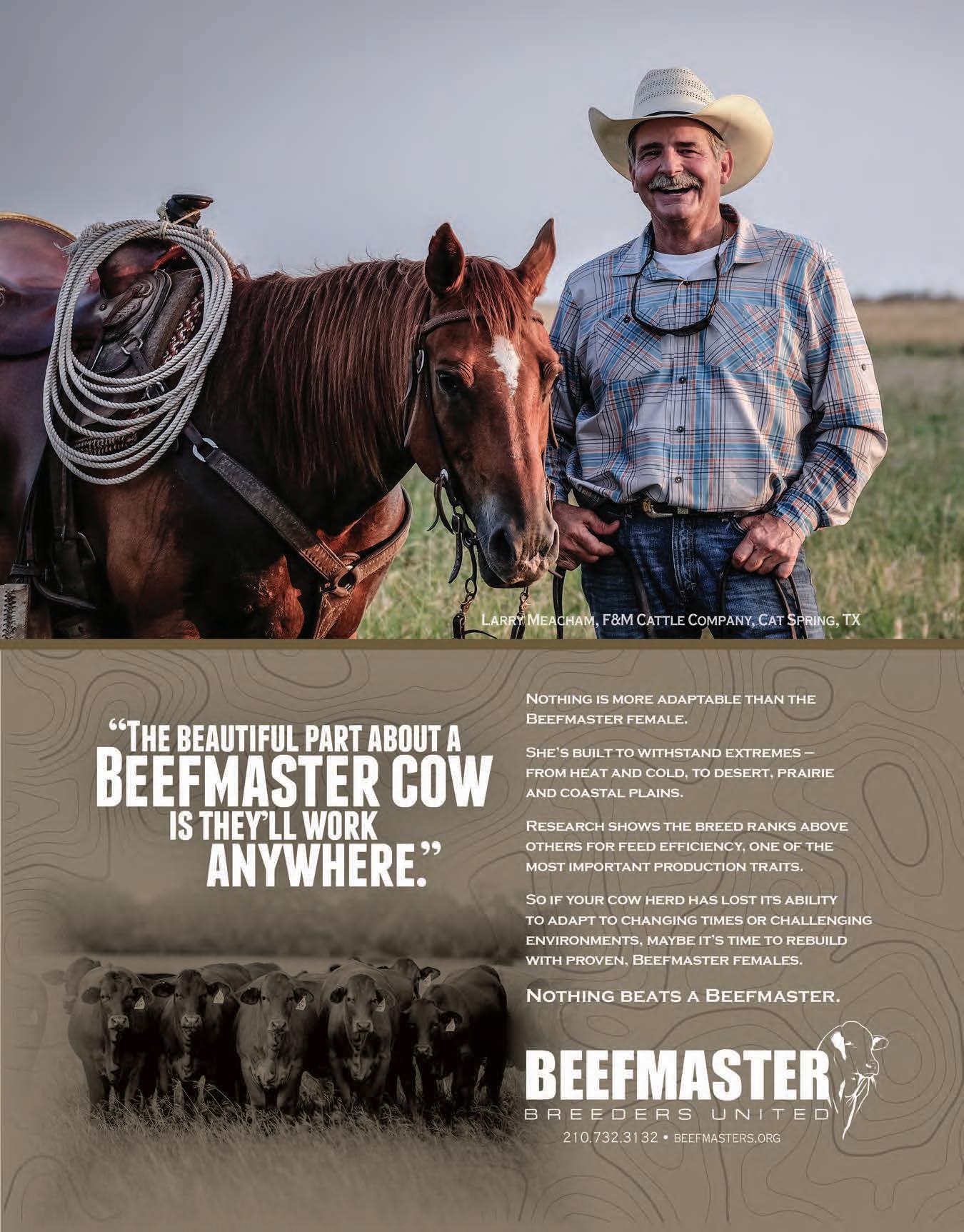
8 minute read
From Texas to Taking Over Sin City
Rodeo Life: This will be your first Wrangler National Finals Rodeo (WNFR) in Las Vegas, are you excited to take over Sin City?
Westyn Hughes: I'm just excited to be a part of it. So many people dream of roping in Las Vegas as a kid and I’m finally getting the chance. I’m not saying I like it over Arlington, or like one better than the other, I'm just glad Arlington was there to have it and I'm glad we got to go to Vegas this year. Wherever it goes after that is fine with me.
Advertisement
RL: How was your first NFR experience in Arlington, TX last year? What did you learn from that experience that will help you at the NFR this year?
WH: You can have stuff go wrong and not be completely out of the picture. Last year I had a long run that knocked me down a few spots in the average. But at the end of the week that run wouldn't have held me back, there were a couple of runs after that I kind of rushed and if I would have just made three more smooth runs after round six, I still would have placed in the average. Hopefully I don't cross that bridge going into this year. If something does happen, I think I can keep my cool a bit more and stay a little more settled.
RL: You won the PRCA Resistol Tie-Down Roping Rookie of the Year in 2016, what did that accomplishment mean to you? How did that award catapult your professional rodeo career? What advice do you have for ropers in their rookie year?
WH: As surprising as it sounds, the award didn’t mean as much to me then as it does now. I look back and feel very fortunate to win that award. It's a huge honor to win that award. At the time, I was kind of bummed out that I didn't make the Finals and I probably should have enjoyed winning it just a little bit more. Only one guy gets a rookie buckle, and you can't ever go back and try again, so I'm glad I got mine.
Really look into your entering because entering is a huge part of it, figure out the setups that not only fit you, but also fit your horse, figure out where the stock contractors you like are going to be at, and know what cattle you rope best on. I rope better on bigger, stronger calves, and some guys are the opposite; some guys like smaller calves and faster setups. You just kind of got to find your niche, then go with it.
RL: How has a “more consistent than fast” roping style played in your favor in your runs?
WH: I would say I don't always hit the biggest licks throughout the year, but I place really, really consistently. I like that style of roping because you don't have as many ups and downs. You're always consistently winning checks. You might not always win first when you should, but you might win third. There's also been a lot of times I won fifth when I wasn't supposed to win anything.
RL: With just fractions of seconds being able to make or break a win and one rodeo being able to make or break your place in the standings, how do you stay mentally sound before and during a run? Are runs different when you are competing for bigger purses?
WH: Basically, you throw out a run when anything goes bad. But I never look at any moment to quit. I always try to show up. You g

can't rush a run, but you can never ever give up in a run either – meaning like when you string the front legs, you don't want to reach down there and rush crossing the feet. But, when a calf kicks you, you don't just want to take your sweet time either. You need to burn those two wraps on and get out of there because there's still a chance you can win last hole. And at the end of the year, 7th and 8th adds up to be a lot.
For some guys, it definitely is. But for me, I bring it the same whether it fits for $500 or $50,000 – it doesn't change. I have the same nerves. I’m nervous for competing in a 1 for 20 jackpot down in Louisiana the same way as I am before I ride in the box at the WNFR. It's roping and I'm there to win every time I show up and I'm there to do the best on what I draw.
RL: How important is physical fitness to your career? What do you work on most?
WH: It's really important because I can always tell when I'm home during the winter. I do a lot of running, agility workouts, and core exercises. My roping is always stronger going into the spring and summer then it is during the fall because when I'm on the road a lot I can't work on my fitness as much as I probably should. Every time I go home and start working out again, I can tell my roping gets a lot sharper. It's in the riding and when I'm locked up to the front of the saddle and am able to stay up there, my neck loop gets a lot more consistent and a lot sharper.
RL: What has been your go-to buckle to sport this season? What buckle will you be wearing at the NFR?
WH: I would say my go to buckle is Oakdale. My Oakdale buckle means a lot to me. I spend a lot of time in Oakdale with Jerold Camarillo and the Camarillo family. They've been really good to me with giving me advice, letting me stay at their house, and with all of their hospitality. Jerold a past World Champion. He won the World in 1969. To be able to hang out with a guy like that all throughout the day and through a big part of the season has definitely helped my career.
I'm going to have a hard time changing it now. I'm going to keep it Oakdale. I don't know if it's lucky or not, it just seems right to put it on.
RL: What attributes make a good cowboy to be able to succeed in rodeo?
WH: You have to be very mentally tough. Rodeo is a tough sport. It can be mentally exhausting and physically exhausting. All the guys I've known that have been successful have all been through down slopes. But the difference between them and other guys is they never quit when they hit their bottom point. They kept going and rode it out and it ended up working out for them. There have had been times I've been to 16 rodeos and never won a check; then there been times I've placed 15 in a row. You're going to have your good days and bad days. You just have to work towards it every day that way you have more good ones than bad ones. If you get a little bit better each day, you'll look up and you'll realize you have come a long way.
RL: What has been the proudest moment in your career so far? What is the ultimate goal for your rodeo career?
WH: I would say throwing my hands up at Redmond, Oregon in 2020 because I knew I just punched my first back number. My ultimate goal is to win a World Championship.

RL: How did you get into rodeo? Has there been anyone who has greatly influenced your career?
WH: The Camarillo family. I'm from Texas, but I come to the California Circuit. I feel like this circuit attracts me because they let calves out a little farther, they are a little bit stronger, and it's more old school roping style. I obviously wouldn't be where I'm at without my family. God has helped direct me along the way.
RL: Is there anything about Tie-Down Roping or the rodeo industry in general that you'd like people to know?
WH: Especially Tie-Down Roping, you lose on your own and you win on your own. I’m not meaning on your own completely, but when you nod your head and once you back in the box, it's all on you at that point. It can be really easy to get down. There was one point in my career, back in 2018, where I couldn't have told you if I was going to keep roping calves. I was on the verge of being done with it. I'm glad I stuck with it because I would have woken up every day not knowing if I could have made it and I finally proved to myself that I could. You have to stick with it. What’s hard is when you're a kid and used to winning and then you hit the pros and might hit a dull spot for some time when all you know is winning. There are a lot of people that don't know how to lose when they get to the pros. It actually hurts them a little more because they had never learned how to deal with losing at the youth and amateur level. I kind of dealt with that some. I feel like my mental game now has come a lot further than it was. I think that's the main reason I win more now than I used to.











